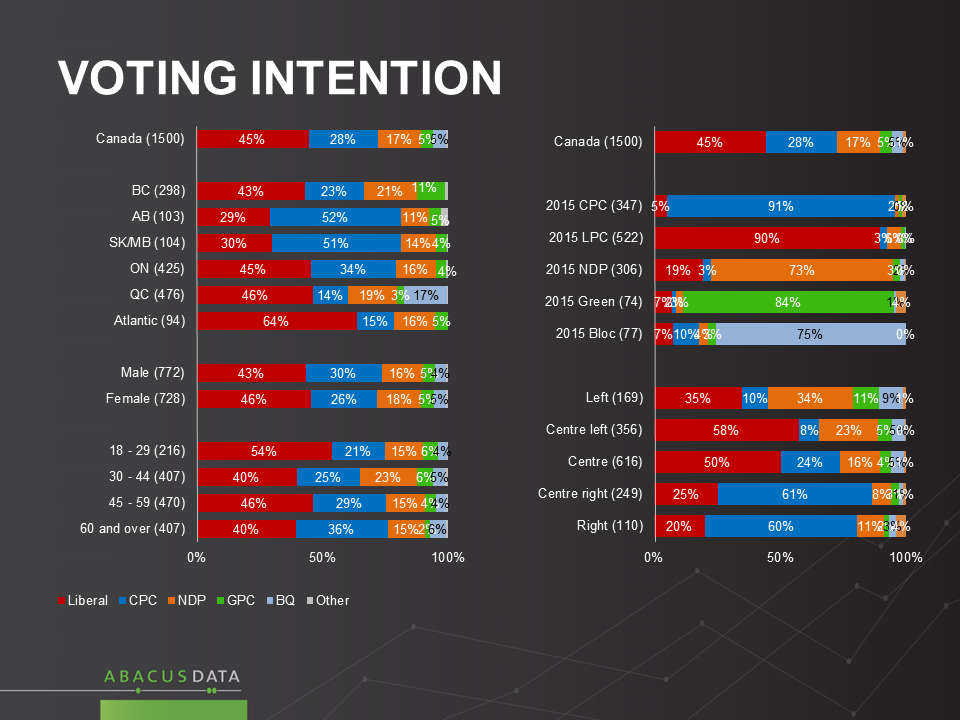The Economy & National Politics?
January 14, 2016
Economic concerns are rising.
Political preferences fairly stable.
LPC 45%, CPC 28%, NDP 17%

A year ago, two thirds of Canadians said the economy was in good shape; one third said it was “poor”. Today, those numbers are reversed, illustrating how significant has been the shift in sentiment. Much of that shift has happened over the last six months.
While this shift has been sizeable, the worry is qualified: the tendency is to describe the decline as a “mild”, rather than a severe recession. Today 28% see the economy as growing, 54% see a mild recession, and 15% say the economic downturn is more severe.
Comparing this result to the numbers we found last August, before the federal election, shows that the movement towards negative sentiment has been about 5 points during that period of time: most of the weakening had happened before people went to the polls.
Economic stress is evident in every region of the country, but is most challenging in Alberta, where 76% say the economy is in poor shape, and Quebec (75%).
Looking deeper into where the shift in economic sentiment has been most acute reveals the largest drops in comfort are found among Albertans (37-point shift since last July), the highest income earners (39-point shift), and Conservative voters (55-point shift).




While economic anxieties have been growing, the effect on political attitudes has been limited. Many more people say the country is heading in the right (45%) rather than the wrong direction (27%). Even in Alberta, 36% say right, 43% say wrong direction. “Wrong direction” sentiment is largely concentrated on the further right and supporters of the Conservative Party.


Federal Voting Intentions
When asked how they would vote if an election were tomorrow, the Liberals hold a wide 17-point margin over the Conservatives and a 28-point margin over the New Democrats. These numbers reveal a slight decline from the remarkably high levels measured before the end of 2015, but are above the support the Liberals achieved on Election Day.

The Liberals continue to hold wide leads in BC (by 20), Ontario (by 11), Quebec (by 27), and in Atlantic Canada (by 48). The strength in Liberal support since the election owes much to the fact that only 73% of those who voted NDP in October say they would vote NDP today: 1 in 5 of them would vote Liberal.

Federal Economic Approach
We asked whether the current state of the economy means that the federal government should do more to stimulate the economy than it had planned on, or stick with the plan it campaigned on. The results show a split in opinion, with 51% saying that the government should do more, and 49% saying it should stick with the plan it campaigned on.
Worth noting is that majorities of CPC (57%) and NDP (58%) supporters say the government should do more than had been planned, while smaller numbers (42%) of LPC supporters feel that way.
Regionally, Ontarians were more likely to think the government should do more than had been planned to stimulate the economy while a majority in every other region feel that the government should stick with the plan it campaigned on.


The Upshot
According to Bruce Anderson: “The economy is no doubt a growing cause of concern for Canadians and will test the level of confidence in this government, as it would for any. So far, the impact on the mood of the country has been muted, except in Alberta where the pain of lower oil prices has been causing extraordinary challenges.
However, at this point, the general tendency is to see the economic downturn as mild rather than severe, and while the government has latitude in public opinion terms to do more to stimulate if it chooses to, these numbers don’t suggest that people believe either that the government has contributed to the economic deterioration, or should consider a major deviation from the course it has been on.
In terms of political preferences, the Liberal Party continues to enjoy broad support. Our releases over the next few days will explore how people are reacting to a broad cross section of measures taken by the Trudeau government.”
Methodology
Our survey was conducted online with 1,500 Canadians aged 18 and over from January 8 to 12, 2016. A random sample of panelists was invited to complete the survey from a large representative panel of over 400,000 Canadians.
The Marketing Research and Intelligence Association policy limits statements about margins of sampling error for most online surveys. The margin of error for a comparable probability-based random sample of the same size is +/- 2.6%, 19 times out of 20. The data were weighted according to census data to ensure that the sample matched Canada’s population according to age, gender, educational attainment, and region. Totals may not add up to 100 due to rounding.
Abacus Data Inc.
We offer global research capacity with a strong focus on customer service, attention to detail and value added insight. Our team combines the experience of our Chairman Bruce Anderson, one of Canada’s leading research executives for two decades, with the energy, creativity and research expertise of CEO David Coletto, PhD. For more information, visit our website at http://www.abacusdata.ca/




